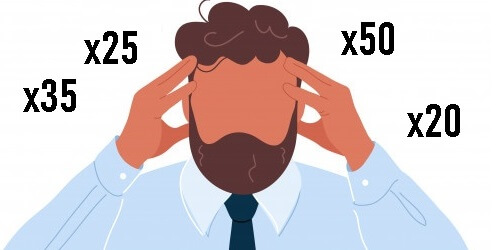What Is Wagering Requirements
Wagering requirements are a way for casinos to prevent people from just cashing in their bonuses and leaving. Let’s say that they are offering a matching bonus on your deposit. When you deposit $100, the casino will give you another $100. So, why not just take the money, and repeat the process? What are Wagering Requirements is a key question for gambling newbies. Online casino bonuses are not free money that can be withdrawn at will. Players have to satisfy the wagering requirements.
A betting strategy (also known as betting system) is a structured approach to gambling, in the attempt to produce a profit. To be successful, the system must change the house edge into a player advantage — which is impossible for pure games of probability with fixed odds, akin to a perpetual motion machine.[1] Betting systems are often predicated on statistical analysis.
- Understanding wagering requirements When it comes to casino bonuses at casinos, one thing players have to be ready for is wagering requirements. This can also be called a playthrough requirement and is standard practice for casinos sites, and indeed throughout the world.
- One of the most common of those is the expected wagering requirement (also called the “playthrough requirement” or “rollover amount”). This defines the number of times a player is required to play through a bonus amount before they can withdraw winnings (or sometimes the bonus PLUS deposit amount as.
Mathematically, no betting system can alter long-term expected results in a game with random, independent trials, although they can make for higher odds of short-term winning at the cost of increased risk, and are an enjoyable gambling experience for some people. Strategies which take into account the changing odds that exist in some games (e.g. card counting and handicapping), can alter long-term results.[1][2][3]
This is formally stated by game theorist Richard Arnold Epstein in The Theory of Gambling and Statistical Logic as:
Theorem 1: If a gambler risks a finite capital over many plays in a game with constant single-trial probability of winning, losing, and tying, then any and all betting systems lead ultimately to the same value of mathematical expectation of gain per unit amount wagered.[1]
Examples[edit]
Common betting systems include:

- Card games – Card counting
- Roulette – Martingale
- Sports – Handicapping
Horse racing[edit]


Some Horse racing betting systems can be based on pure statistical analysis of the odds, while others also analysis of physical factors (e.g. the horses' form, jockey form and lane draw). Common forms of betting systems for horse racing are:

- hedging- betting on multiple outcomes in a race
- arbitrage- lay the horse a low price and back it at a high price
See also[edit]
Low Wagering Casino
References[edit]
What Is Wagering Requirements In Bet9ja

What Is Wagering Requirements For A
- ^ abcEpstein, Richard A. (2014-06-28). The Theory of Gambling and Statistical Logic, Revised Edition. Gulf Professional Publishing. p. 53. ISBN9780080571843.
- ^Shackleford, Michael. 'The Truth about Betting Systems - Wizard of Odds'. wizardofodds.com. Retrieved 2017-10-09.
- ^Burrell, Brian (1998). Merriam-Webster's Guide to Everyday Math: A Home and Business Reference. Merriam-Webster. p. 226. ISBN9780877796213.